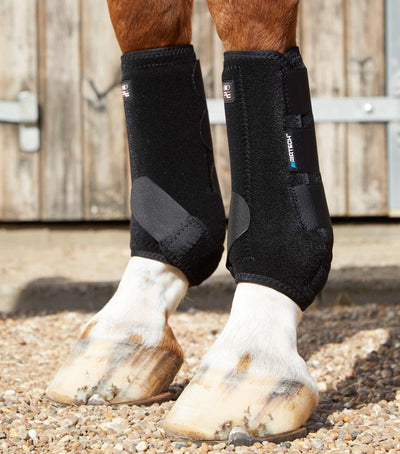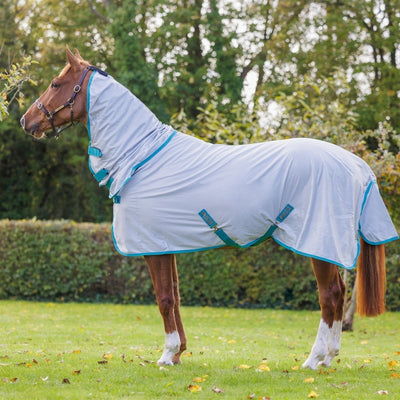Why Fly Masks are Essential for Your Horse's Health and Comfort
Horse riders who love their equine companions have an overriding concern for their horse’s health and comfort. However, one of the most significant challenges facing horses in Australia is the abundance of insects, particularly flies and mosquitoes. These pests not only cause discomfort and irritation to horses, but can also carry diseases that can lead to serious health issues. In this article, we discuss the importance of using fly masks for horses in Australia and how they can prevent injuries and illnesses, including eye injuries, respiratory issues, and skin conditions.
What is a fly mask?
A horse fly mask is a type of protective gear worn by horses to shield their face, eyes, and ears from flies, insects, and harmful UV rays. Fly masks are typically made of lightweight and breathable materials such as mesh or nylon and are designed to fit comfortably over a horse's head. Some fly masks also come with additional features such as ear covers, UV protection, and nose flaps.
Fly masks vs fly veils?
At this stage, it’s important to briefly cover the relationship between the terms fly mask and fly veil. While they are sometimes used interchangeably, there are some essential differences between the two:
- A fly mask typically refers to a more substantial piece of protective gear that covers the horse's entire face, including the eyes, ears, and nose. Fly masks are often made of more durable materials and are designed to provide comprehensive protection against flies, insects, and UV rays.
- A fly veil, on the other hand, is usually a lighter-weight piece of equipment that covers only the horse's ears. Fly veils are often made of crochet or other lightweight materials and are primarily designed to help reduce noise and distractions for the horse during competition or training.
Tack tip - While both fly masks and horse fly veils can help protect against flies and other insects, fly masks provide more comprehensive protection for the horse's face, particularly around the eyes and nose.
Fly masks are an essential piece of equipment for horse owners in Australia and for good reason. They are designed to fit over a horse's head and cover their eyes, ears, and nose, providing protection against various injuries and illnesses. Let’s explore some of these critical areas now.
Eye injuries
One of the most significant injuries that can occur to a horse's eyes is caused by flies. Flies are drawn to the moisture and warmth around a horse's eyes and often attempt to land on or near them. When a fly lands on a horse's eye, it can cause irritation and discomfort, leading the horse to rub their eyes on nearby objects to try and alleviate irritable sensations. This rubbing can cause abrasions to the cornea, leading to further complications such as infections and even blindness.
The Australian sun can also be incredibly harmful to a horse's eyes. The sun's UV rays can cause damage to a horse's eyes, leading to cataracts, cloudiness, and other vision problems.
Protection - Fly masks that cover a horse's eyes can prevent this type of injury by providing a physical barrier between the flies and the horse's eyes. Additionally, fly masks with UV protection can help prevent sun damage to the eyes, leading to cataracts and other vision problems over time.
Respiratory issues
Another benefit of fly masks is their ability to prevent respiratory issues. Flies and other insects can carry dust, pollen, and other irritants that can cause a horse to cough, sneeze, or develop other respiratory problems. These irritants can also exacerbate pre-existing respiratory conditions, such as heaves or asthma.
Protection - Fly masks that cover the nose and mouth can prevent the inhalation of these irritants, reducing the risk of respiratory issues. Additionally, horse fly masks made of breathable material allow for proper ventilation, ensuring that your horse can breathe comfortably and without restriction.
Skin conditions
In addition to preventing eye and respiratory issues, fly masks can also help prevent the emergence of skin conditions. Flies and other insects can carry bacteria and other pathogens that can cause skin irritation, infection, and even allergic reactions. Additionally, the bites of certain insects, such as horseflies, can cause painful welts and open wounds on a horse's skin.
Protection - Fly masks covering a horse's nose, ears and face can prevent these types of skin conditions by stopping the bites that lead to bacteria and pathogen exposure. Masks made of lightweight and breathable material can also help avoid sweating and skin irritation, leading to further skin problems.
Tack tip - Horses with light-coloured or pink skin and those with white markings on their faces are particularly susceptible to sun damage. A high-quality fly mask with UV protection can help prevent sunburn and other skin damage.
Fly masks are no shortcuts
While fly masks are an effective tool for preventing injuries and illnesses caused by insects, they should never be used as a replacement for responsible management practices. Read our previous blog article for suggestions on how strategies like proper stable hygiene and manure management in and around the stable can further reduce the risk of insect-borne illnesses and injuries.
In conclusion
Fly masks are essential for horse owners in Australia to ensure their horse's health and comfort. These simple but effective pieces of equipment can prevent various injuries and illnesses, including eye injuries, insect bites, sunburn, and allergic reactions. By investing in a high-quality fly mask with UV protection and a secure fit, horse owners can better ensure their horse's safety and well-being all year round.
As always, if you need more information, contact us here, and we’ll get back to you and help answer all your questions.
















